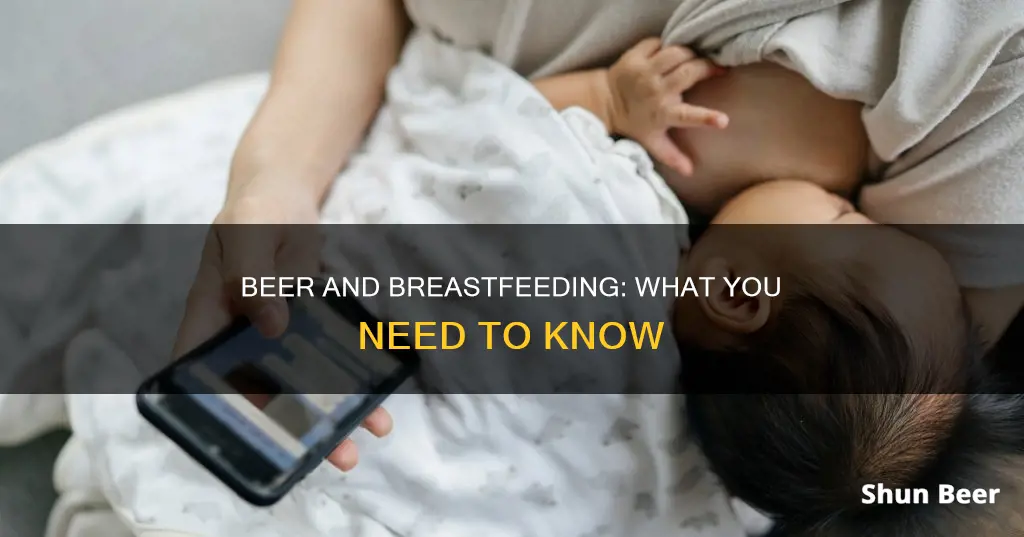
Drinking alcohol while breastfeeding is a topic that has been widely researched. While abstinence is recommended by some health care providers, others state that alcohol consumption by breastfeeding women carries little risk. The safest option while breastfeeding is to avoid alcohol altogether. However, occasional light drinking while breastfeeding has not been shown to have adverse effects on babies.
The amount of time it takes for alcohol to leave the body and breast milk varies depending on the amount consumed, with one drink taking around two hours to metabolize. The more drinks consumed, the longer it takes for the alcohol to clear the body. It is recommended to wait at least two hours after drinking one standard drink before breastfeeding.
Alcohol can affect the hormones that control breast milk production and reduce supply. It can also inhibit the milk ejection reflex, resulting in the baby receiving less milk. Additionally, alcohol in breast milk can change its taste and smell, causing the baby to be reluctant to feed.
While drinking small amounts of alcohol occasionally while breastfeeding is generally considered safe, regular or heavy drinking is not advised. It can affect milk supply, make the baby sleepy, and impact their growth and development.
| Characteristics | Values |
|---|---|
| Is it safe to drink beer while breastfeeding? | According to the Centers for Disease Control and Prevention (CDC), the safest option is to abstain from alcohol while breastfeeding. However, occasional light drinking is generally considered safe and is not known to have adverse effects on babies. |
| How much alcohol is safe to consume while breastfeeding? | It is recommended to limit alcohol consumption to no more than one drink per day. One standard drink is defined as 12 oz. of 5% ABV beer (about one can), 8 oz. of 7% ABV malt liquor (around the size of a standard drinking glass), 5 oz. of 12% ABV wine (one glass), or 1.5 oz. of 40% ABV liquor (one shot). |
| How long should you wait after drinking beer before breastfeeding? | It takes about two hours for the average adult to metabolize one drink. It is advised to wait at least two hours after consuming a 12-ounce beer before breastfeeding. If you drink more than one beer, wait an additional two hours for each additional drink. |
| Does beer affect breast milk production? | Alcohol can affect the hormones that control breast milk production (prolactin and oxytocin) and may reduce milk supply. It also inhibits the milk ejection reflex, resulting in the baby receiving less milk. |
| Can beer increase breast milk supply? | While the barley in beer can boost prolactin production, the alcohol component decreases milk production. The idea that beer increases milk supply may have been true in the past due to traditional brewing methods, but modern beers with higher alcohol concentrations are more likely to lower milk supply. |
| What are the short-term effects of drinking beer on a breastfeeding baby? | Studies have shown that babies may experience reduced milk intake, changes in sleep patterns, and increased irritability after exposure to alcohol in breast milk. |
| What are the potential long-term effects of drinking beer while breastfeeding? | There is limited research on the long-term effects, but one study found that children exposed to alcohol in breast milk as babies scored lower on reasoning tests at ages 6-7 compared to those who were not exposed. |
What You'll Learn

How much alcohol passes into breast milk?
Alcohol passes freely from a mother's bloodstream into her breast milk. The amount of alcohol in breast milk is similar to the amount in the mother's blood and peaks 30 to 60 minutes after drinking. The amount of alcohol in the milk is estimated to be 5% to 6% of the weight-adjusted maternal dose.
The length of time alcohol can be detected in breast milk depends on the amount consumed. Alcohol from one drink can be detected for about 2 to 3 hours, while two drinks can be detected for about 4 to 5 hours, and three drinks for about 6 to 8 hours, and so on. Other factors that influence the amount of alcohol in breast milk include how fast the alcohol is consumed, whether it is consumed with food, the mother's body weight, and individual variations in alcohol absorption and metabolism.
To minimise the amount of alcohol passed to the infant, it is recommended to wait at least 2 hours after drinking one alcoholic beverage before breastfeeding. The more alcohol consumed, the longer it takes for the alcohol to clear from the breast milk.
Beer Drinkers: Alcohol's Potassium-Depleting Effects
You may want to see also

How long after drinking beer is it safe to breastfeed?
The amount of time it takes for alcohol to leave your breast milk depends on how much you've drunk, what you've eaten, and how quickly you're drinking. According to the Dietary Guidelines for Americans, it's recommended to wait at least two hours after drinking one alcoholic beverage before breastfeeding. If you've had two drinks, you should wait four to five hours. This is because it takes about two hours for the average adult to metabolize one drink.
It's important to note that alcohol levels in breast milk are similar to blood alcohol levels and reach their highest point about 30 to 60 minutes after drinking. If you don't have another drink, the concentration of alcohol in your breast milk will gradually decrease. As your liver metabolises alcohol, causing your blood alcohol level to drop, so does the alcohol level in your breast milk.
It's also worth considering that the more you drink, the longer it takes for your body to clear the alcohol from your system. Therefore, it's generally advised to avoid drinking alcohol until your baby is at least three months old. If you do choose to drink, it's recommended to plan ahead, understand your body, and drink responsibly.
Drinking Beer While on Antidepressants: What You Should Know
You may want to see also

Does drinking beer affect breast milk supply?
Drinking beer can indeed affect breast milk supply. However, this effect is not necessarily correlated with the amount of beer consumed by the mother.
The barley in beer contains a polysaccharide that increases prolactin production, which in turn stimulates breast milk production. However, alcohol decreases milk production and inhibits the milk ejection reflex, resulting in the baby consuming less milk. This is supported by a 2001 study, which found that babies consumed approximately 20% less breast milk during the first four hours after their mothers consumed alcohol, despite spending a similar amount of time on the breast.
The alcohol in beer also affects the sensory qualities of breast milk, giving it a stronger odour. This change in flavour may also contribute to the reduced milk intake by infants, although further research is needed to confirm this.
It is recommended that breastfeeding mothers who choose to consume alcohol do so in moderation, limiting themselves to one drink per day and avoiding breastfeeding or pumping for at least two hours after drinking.
How Sales Jobs Can Be Your Dream Career
You may want to see also

What are the short-term effects on the baby?
While the long-term effects of alcohol consumption while breastfeeding are less understood, there are several short-term effects on the baby that have been observed.
Firstly, alcohol can cause changes in an infant's sleep patterns. Studies have shown that babies breastfed by mothers who consumed alcohol prior to nursing slept for 25% less time on average. While the total amount of sleep remained unchanged in two studies, the sleep was more fragmented. In other words, the babies experienced increased REM sleep and more frequent wakefulness.
Secondly, alcohol consumption by the mother can lead to decreased milk intake by the baby. This is due to the inhibitory effect of alcohol on the milk ejection reflex, resulting in a reduction of milk supply. Studies have found that babies consume approximately 20% less milk in the first 4 hours after maternal alcohol consumption.
Thirdly, alcohol can cause developmental and neurological problems in the baby, including delayed motor development and potential impairment of cognitive development. A study by Little et al. (1989) found that infants exposed regularly to alcohol in breast milk had significantly lower Psychomotor Development Index (PDI) scores, indicating impaired motor development.
Finally, alcohol consumption by the mother can interfere with the baby's weight gain. Excessive alcohol intake can lead to abnormal weight gain and slow linear growth in infants.
It is important to note that the effects of alcohol on the baby depend on various factors, including the amount of alcohol consumed, the time elapsed since consumption, and individual variations in metabolism. As a general guideline, it is recommended to wait at least 2 hours after consuming one drink before breastfeeding.
Beer and Rum: Mixing Alcohol Safely
You may want to see also

What are the long-term effects on the baby?
When a breastfeeding mother consumes alcohol, it is important to understand the potential long-term effects on the baby to ensure their health and well-being. Here is some information on this:
Alcohol can have significant long-term effects on a baby's development, even in small amounts. When a breastfeeding mother consumes alcohol, it passes into her breast milk at a similar concentration to her blood alcohol content. This means that the baby is consuming alcohol as well. While the immediate effects may be noticeable, such as changes in the baby's sleep patterns or feeding behavior, the long-term effects are more concerning.
One of the potential long-term effects is impaired brain development. Alcohol can interfere with the growth and development of the baby's brain, particularly the cerebral cortex, which is responsible for higher cognitive functions. This can lead to issues with learning, memory, and problem-solving skills as the child grows older. Additionally, there is a risk of long-term behavioral problems, including attention disorders, hyperactivity, and even a higher risk of alcohol abuse or dependence later in life.
Another area of concern is the baby's developing immune system. Alcohol consumption by the mother can impact the immune-protective properties of breast milk, making the baby more susceptible to illness and infections. This can lead to frequent illnesses during infancy and potentially long-term immune system weaknesses.
Furthermore, long-term exposure to alcohol through breast milk can impact the baby's growth and development. It can interfere with the absorption of important nutrients, leading to potential issues with weight gain and overall growth. Additionally, alcohol can disrupt the balance of hormones involved in growth and development, potentially affecting the baby's height and proportional growth.
It is important to note that while these long-term effects are possible, the impact can vary depending on several factors. These include the amount and frequency of alcohol consumption, the age of the baby, and individual variations in metabolism and genetics. To minimize potential risks, it is generally recommended that breastfeeding mothers limit their alcohol intake and ensure that they do not breastfeed while intoxicated. Pumping and dumping milk after alcohol consumption may be considered, but it is not necessary, as the amount of alcohol transferred to the baby through breast milk is typically low and metabolized quickly.
In conclusion, while occasional drinking in moderation may not cause significant harm, regular or excessive alcohol consumption while breastfeeding can have long-lasting effects on the baby. It is crucial for mothers to make informed decisions and seek professional advice if they have concerns or notice any changes in their baby's development. Prioritizing the baby's health and well-being is of utmost importance.
Beer and Prednisone: Is It Safe to Drink?
You may want to see also
Frequently asked questions
According to the Centers for Disease Control and Prevention (CDC), not consuming alcohol at all while breastfeeding is the safest option. However, occasional light drinking while breastfeeding has not been shown to have adverse effects on babies.
It takes about two hours for the average adult to metabolize one drink. It is recommended to wait at least two hours after drinking one standard drink before breastfeeding. If you've had two drinks, wait four to five hours.
The barley in beer can boost prolactin production, which stimulates breast milk production. However, the alcohol in beer decreases milk production and inhibits the milk ejection reflex.
Drinking beer while breastfeeding may affect your milk supply and let-down reflex. It can also cause developmental and neurological problems in the baby and trouble gaining weight.
Pumping and dumping will not remove alcohol from your breast milk or speed up its metabolization. It is only recommended if you need relief from engorgement.







